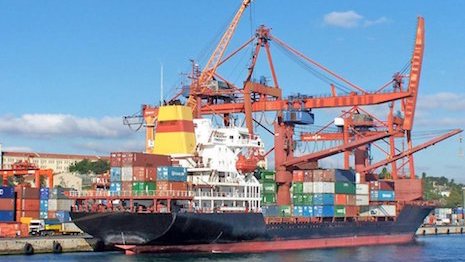 The ongoing trade war between the U.S. and China is causing uncertainty. Image credit: USFIA
The ongoing trade war between the U.S. and China is causing uncertainty. Image credit: USFIA
MADRID – Despite a strong global economy, political developments and population changes are likely to put pressure on many countries’ resources.
Experts shared a pessimistic outlook for the near future of the global market during a panel at FT Business of Luxury Summit on May 20 moderated by Financial Times associate editor and chief economics commenter Martin Wolf. Trade wars and a weakening of the European Union have the possibility of increasing national debts or causing recessions.
“Politics have become immensely important in shaping the world and it’s a real question of the future of our global economy,” Mr. Wolf said.
New cold war?
In the United States, unemployment has reached record lows and recent inflation has been limited. Government deregulations have also spurned investing.
These indicators of economic health, however, did not dissuade Willem Buiter, a special economic advisor at Citi, from describing the U.S. economy as “over performing.”
Chinese consumers are still showing a heavy appetite for luxury goods. Image credit: Fendi
Similarly, investors have been cautious about China’s exploding economy potentially slowing down.
“China is not a showstopper, it is a show-slower,” Mr. Buiter said.
A trade war between the two countries also seems likely to continue.
This month President Donald Trump decided to raise tariffs on Chinese imports from 10 percent to 25 percent. In response, China is also upping duties on thousands of products to 25 percent (see story).
There are also increased tensions between the U.S. and China regarding technology innovations. Last week, the Trump administration banned U.S. governments from conducting business with Chinese smartphone company Huawei.
Mr. Buiter believes that the trade war and technology war characterize a new Cold War, which he warned may last decades.
Tariff increases may force the U.S. to increase imports from other Asian nations, with the unintended consequence of increasing the country's trade deficits with those governments.
Similarly, many European nations also have debts that are outpacing their gross domestic product.
The populations in many European countries are aging. Image credit: Missoni
Increases in age expectancy and decreases in birth rates are also straining European economies, according to Guillermo de la Dehesa Romero, international adviser at Goldman Sachs and Santander.
Without government increases in retirement ages, pension funds are likely to be depleted. The panelists also encouraged governments to make it more fiscally attractive for young people to have children, by improving child care benefits.
European anxieties
Increasing debts in Europe may put countries such as Italy in similar positions to Greece earlier this decade.
Mr. Buiter also asserted his belief that a no-deal Brexit is increasingly likely, which could spurn a recession in the United Kingdom and Ireland.
Uncertainty is significant throughout the United Kingdom, where consumers and brands alike are wary of a post-Brexit future and the terms that will be settled on. This is especially true for wealthy British consumers, with a new report from Altiant finding that 23 percent of them are considering leaving the U.K. if it does in fact completely separate from the European Union (see story).
However, along with advancements in automation and artificial intelligence, the analysts believe immigration will help revive European economies as work forces shrink. Mr. Buiter pointed out that both population and economic growth in Africa are expected to continue.
As the BRIC nations have become increasingly developed, Sub-Saharan Africa has emerged as the “next big thing,” according to a report by A.T. Kearney.
Research suggests that the countries within the Sub-Saharan region of Africa will likely grow in potential over the next decades due to a young, fast-growing and connected middle class, many of whom are still discovering their next favorite brands. A.T. Kearney’s “Retail in Africa: Still the Next Big Thing” report, part of the “2015 African Retail Development Index,” looked closely at these consumers and the economies of their home countries to determine the opportunity for retail marketers as a shopping culture emerges (see story).
Nonetheless, positive developments in Africa are unlikely to resolve economic anxieties around the globe.
“Nothing is forever, but things always last longer than you think is possible,” Mr. Buiter said.


